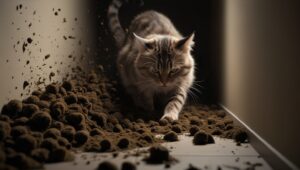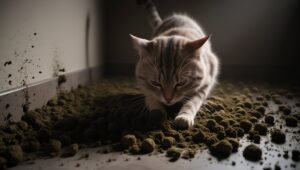How Often Cat Poop?
A Complete Guide for Concerned Cat Parents
Introduction If you’re a cat owner, you’ve probably found yourself asking, “Is my cat pooping enough?” or “Is my cat pooping too much?” As strange as it may seem, monitoring your cat’s bathroom habits is an essential part of ensuring their overall health. Poop can tell you a lot about your cat’s diet, hydration, and even potential health issues. In this blog post, we’ll answer the question, “How often should my cat poop?” and explain what’s normal, what’s not, and when you should call your veterinarian.

How Often Should a Healthy Cat Poop? On average, a healthy cat should poop once a day. However, this can vary depending on factors such as age, diet, hydration, and activity level. Some cats may poop twice a day, while others might go every 36 to 48 hours. As long as the stool is well-formed, easy to pass, and your cat isn’t showing signs of discomfort, these variations are typically nothing to worry about.
Factors That Affect Cat Poop Frequency
- Diet: Cats on a high-fiber diet or wet food diet tend to poop more frequently than those on a low-fiber or dry food diet. Wet food contains more moisture, which helps with digestion and stool production.
- Age: Kittens tend to poop more frequently than adult cats due to their faster metabolism and more frequent feeding schedules.
- Hydration: Dehydration can lead to constipation in cats. Cats that drink enough water or eat wet food are less likely to struggle with hard, dry stools.
- Activity Level: Cats that are more active tend to have healthier digestive systems and may poop more regularly.
- Health Conditions: Conditions like constipation, diarrhea, or gastrointestinal issues can disrupt a cat’s normal poop schedule. Parasites, infections, or changes in routine can also have an impact.
What Does “Normal” Cat Poop Look Like? Normal cat poop should be:
- Brown in color: A healthy stool is usually medium to dark brown.
- Firm but not hard: The stool should be firm enough to hold its shape but not so hard that it’s difficult for your cat to pass.
- Well-formed: It should resemble a small log or sausage shape.
- Odor control: While cat poop isn’t known for its pleasant aroma, it shouldn’t have an excessively foul smell.
If you’re noticing black, white, green, or yellow poop, or if it’s overly watery or as hard as a rock, it’s worth discussing with your veterinarian.

Signs Your Cat May Have a Pooping Problem
- Constipation: If your cat is straining to poop, crying out while in the litter box, or has dry, hard stools, they may be constipated.
- Diarrhea: Loose, watery stools could be a sign of dietary changes, infections, or parasites.
- Frequency Changes: If your cat suddenly starts pooping much more or much less frequently, it’s a signal that something may be off.
- Blood or Mucus in Stool: These can be signs of gastrointestinal distress, parasites, or a more serious health issue.
When to Call the Vet If your cat hasn’t pooped in 48 hours or is showing signs of distress, it’s a good idea to consult your veterinarian. Likewise, if you notice blood, mucus, or significant changes in stool color or texture, professional advice is recommended.
Tips to Keep Your Cat’s Digestive Health on Track
- Feed a Balanced Diet: Ensure your cat’s diet includes the right balance of protein, fiber, and moisture.
- Hydration is Key: Encourage your cat to drink more water or incorporate wet food into their diet.
- Exercise: Play with your cat to keep them active, as this promotes a healthy digestive system.
- Regular Vet Checkups: Regular checkups can help you catch potential digestive issues before they become major problems.
- Monitor Poop Changes: Get to know your cat’s “normal” poop schedule and characteristics so you can spot problems early.
Conclusion Knowing how often your cat should poop is a crucial part of being a responsible pet parent. While once a day is the general rule of thumb, some cats may have their own unique schedules. Pay attention to the frequency, appearance, and consistency of their stools, as well as any signs of discomfort. When in doubt, it’s always best to reach out to a veterinarian. After all, a healthy cat is a happy cat — and that’s something every cat parent wants.
Leave a Reply